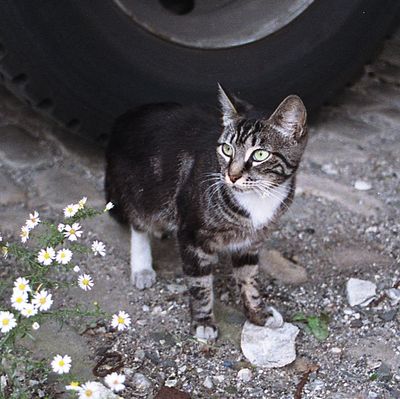
Volunteers with the NYC Feral Cat Initiative are working to repurpose some of the city’s population of as many as half-a-million stray cats as feline special forces in the war against the rats. The Associated Press reports that the group is working to trap wild cat colonies throughout New York, spay or neuter the animals, and when the cats can’t be adopted or returned to the place they were trapped, the group will try to relocate them to areas in need of rodent control.
One such successful campaign is at Manhattan’s Javits Convention Center, where sustainability manager Rebecca Marshall says they used to hire exterminators to deal with an expensive rat problem around the facility’s loading docks, but then realized that nature had a “better solution” which would cost practically nothing and help the center avoid the use of rat-killing chemicals. Marshall recently told DNA Info that a few years ago they enlisted the help of the Feral Cat Initiative for help, and they moved some cats from a displaced colony — including the now-essential, four-feline team of Sylvester, Alfreda, Mama Cat, and Ginger — to the docks as part the group’s trap-neuter-return program. In that, and other cases, the initiative’s Mike Phillips stresses they only move cats “when it’s absolutely necessary for their survival,” like when their habitat becomes a construction site or when the cats are considered a nuisance, and that the group conducts a site evaluation of any potential relocation spot. As an added bonus, six cats that were moved to Javits Center were ultimately adopted by employees or visitors, which is the ideal outcome for any stray cat that can adapt to becoming a pet, especially considering the many dangers cats face on the street.
Of course, any bodega owner in the city can attest to the utility and adorableness of cat co-habitation, and the Feral Cat Initiative adds that cats don’t necessarily have to kill all the rats, either, since the presence of feline pheromones alone can help suppress the rodent population. (It should also be noted that not everyone loves having stray cats around, since they are often considered a threat to migratory birds.) The AP explains that the Feral Cat Initiative is run through the privately funded Mayor’s Alliance for NYC’s Animals, which comprises some 150 animal-rescue groups and shelters. About 6,000 volunteers have been trained in workshops on the proper ways to trap cats through the initiative, and those skills are always in-demand considering the pace of development in New York, which is most often the reason feral cat colonies need to be relocated.
CNN reported earlier this year that a similar project in Chicago, Cats at Work, has been running for the past five years. A paid service of the Tree House Humane Society, which manages some 650 cat colonies in the city, the program transplants small colonies to meet the rodent-control needs of businesses and homeowners:
The organization doesn’t merely drop the cats off in a new neighborhood. “The cats would honestly have no reason to stay, they don’t know the area,” said Liz Houtz the Community Cats Program manager. Instead they acclimate the cats, using giant dog crates turned cushy “kitty apartments,” with a litter box, scratching post, toys and shelter to protect them from the rain, until they feel at home.
It takes about four weeks for the cats to get used to each other and to their new territory’s sounds and smells. The colony’s caretaker agrees to feed them twice daily and provide shelter and vet care as necessary.
One success story for the program was Chicago’s Empirical Brewery, which even maintains a Twitter account for their celebrated feline employees, who were named after Ghostbusters characters via an online contest, and who have eliminated what was once a costly rat problem:
Added Houtz to CNN, “As far as rodent control goes, [cats are] nearly 100% effective. It’s the only long-term, permanent solution there is.”






























